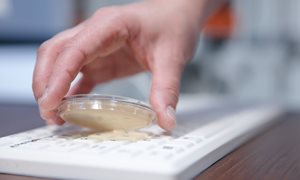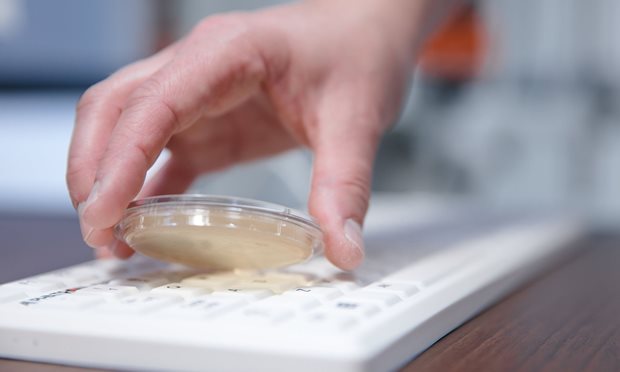The Hygiene and Infection Prevention team (HIP) advises healthcare departments in our hospital about preventing infections. This is important because the patients at Radboud university medical center have (temporarily) reduced immune resistance. They are susceptible to infection.


What does the HIP do for patients?
The HIP does everything it can to ensure that you do not acquire an infection. We do this from the second you arrive at our hospital, right up until the moment you leave. read moreWhat does the HIP do for patients?
Patient safety
The HIP does everything it can to ensure that you do not acquire an infection. We do this from the second you arrive at our hospital, right up until the moment you leave.
Hand disinfection
Nurses, doctors, and other employees disinfect their hands with hand sanitizer. In doing so, they kill a large number of microorganisms that live on the hands. They are also not permitted to wear rings, watches, or bracelets in the workplace. Using a hand scanner, we are able to check whether employees have sanitized their hands properly. If necessary, we provide guidance in how this is done properly. We also assess whether employees are actually disinfecting their hands at the appropriate times in practice.
Device is in place which indicates whether employees have properly disinfected their hands.
Preventing the spread of (resistant) bacteria, viruses, or fungi
You may be carrying an illness-causing bacteria, virus, or mold without realizing it. More and more of these bacteria are resistant to certain types of antibiotics and, as a result, cannot be treated. If that is the case in your situation, the HIP will advise you on how we can examine or treat you without enabling the virus or bacteria to spread. For instance, you may be cared for in a separate area from other patients (isolated care).
Reducing the number of hospital infections
We record all infections that occur in our hospital. We also work with the national infection registration system. In doing so, we are able to quickly determine where potential problems may occur, allowing us to address them. In this way, we prevent (outbreaks of) hospital infections. Ultimately, we want to further reduce the number of hospital infections at Radboud university medical center.
For instance, by monitoring contamination on surfaces and equipment in the patient environment.
How to prevent infections?
We do everything we can to ensure that you do not acquire an infection. However, we cannot always prevent this at the hospital. What can you do from your end in order to minimize the risk of infection? read moreHow to prevent infections?
We do everything we can to ensure that you do not acquire an infection. However, we cannot always prevent this at the hospital. What can you do from your end in order to minimize the risk of infection?
What is an infection?
Infections are cause by microorganisms. Microorganism is a blanket term that includes bacteria, viruses, and mold. Every person carries billions of microorganisms on their bodies, primarily bacteria. Certain microorganisms can make you sick. If you are healthy, you have enough immune resistance to fight them. However, if your immune resistance is weakened, your body can no longer protect you against the pathogen as well. If you are admitted to a hospital, you may well have a weakened immune resistance. This can occur due to an operation or treatment, or simply because you are sick. An infection can occur. Signals of infection are redness, swelling, fever, and pain.What can you do prevent infections from your end?
- Regularly wash your hands, e.g. after using the toilet.
- Use proper hygiene when coughing: cough into a paper tissue, throw the tissue away, and disinfect your hands afterwards.
- When leaving the room, always disinfect your hands.
- Do not touch wounds, IVs, or catheters with your hands.
- Follow any additional precautionary measures that apply to you closely.
- Have your visitor discuss with the caretakers whether it is reasonable for them to visit you.
- Visitors can also cause infections, e.g. if they have a cold or infection.
What if you have an infection before you arrive at the hospital?
- If you suspect that you have an infection, notify the hospital, preferably by telephone. Examples of these kinds of illnesses and infection symptoms are stomach flu with diarrhea, a sore throat, or chicken pox.
- Inform us if you work with live pigs, cattle or chickens for slaughter, or if you have recently been treated at a foreign hospital. If so, you will have an increased risk of carrying the MRSA bacteria. We can then take appropriate action.

